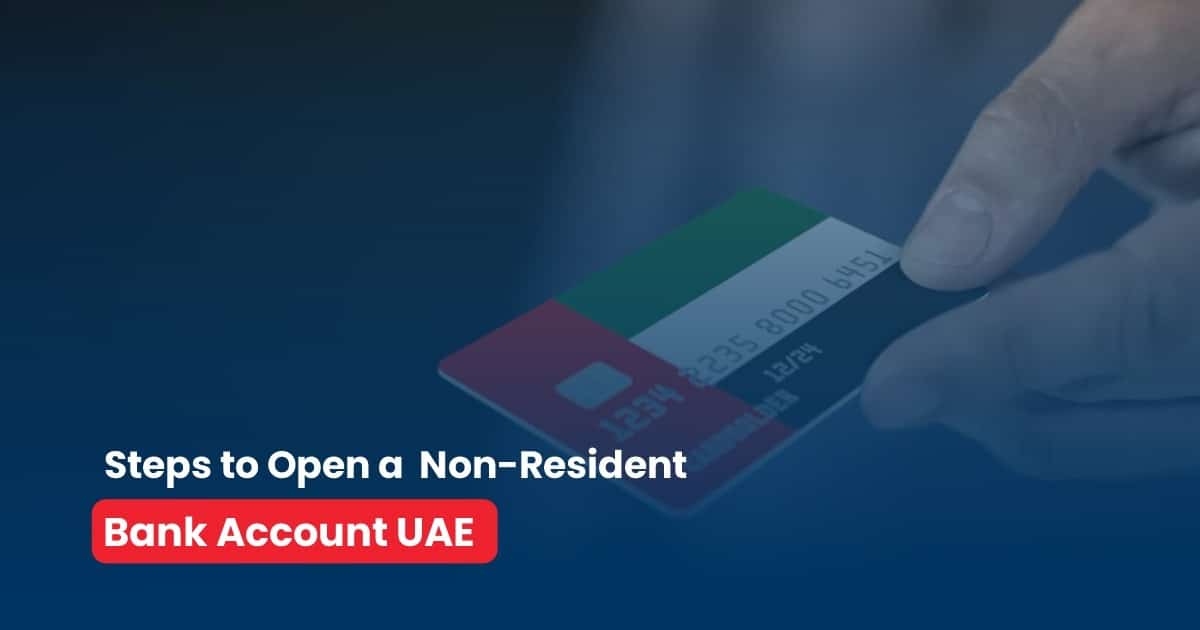Want to Open a Non-Resident Bank Account UAE? You’re in good company. Non-resident deposits in UAE banks surged to AED 248.4 billion in early 2025, up 15.6% from the previous quarter, reflecting growing confidence in UAE banking. But do you know how to open your account? In this guide, we’ll walk you through the 5 easy steps, key documents, and which banks offer the smoothest process for non-residents. Start today and get your UAE banking set up with ease.
Table of contents
|
What is a non-resident bank account UAE?
A non-resident bank account UAE is one for people who live outside the UAE. You don’t need a visa to apply. Many open it to save, invest, or manage money. UAE banks allow easy transfers, multiple currencies, and online access. Since requirements vary, always check with the bank first. This option helps you stay connected to UAE banking while living abroad. It’s simple, secure, and built for international users.
Non-Resident Bank Account UAE: Who Qualifies? 10 Key Facts
Opening a non-resident bank account in the UAE is a practical step for individuals and businesses seeking to manage finances within the country. The UAE’s strong banking system ensures safe and effective money management by providing a range of services catered to non-residents.
10 People Who Can Open a Non-Resident Bank Account UAE Today?
Discover the diverse individuals and businesses that qualify for banking services in the Emirates without needing residency status.
- Foreign Investors: Individuals aiming to invest in UAE markets or real estate.
- Business Owners: Entrepreneurs managing international transactions or establishing a presence in the UAE.
- Frequent Travelers: Those who regularly visit the UAE for business or leisure and require local banking services.
- Expatriates: Non-residents planning to relocate or seeking to manage finances in the UAE.
- Students: International students enrolled in UAE institutions need a local account for expenses.
- Remote Workers: Professionals working with UAE-based companies or clients.
- Retirees: Retirees: Individuals spending significant time in the UAE after retirement.
- Property Owners: Non-residents owning property in the UAE who need to handle related financial matters.
- Individuals with UAE Ties: Those with family or financial connections to the UAE.
- High Net-Worth Individuals: People seeking to diversify their banking portfolio in a stable economy.
Things to Keep in Mind
- In-Person Application: Non-residents are generally required to visit the UAE in person to open a bank account.
- Minimum Balance Requirements: To keep the account open, some banks could have minimum balance requirements.
- Bank-Specific Requirements: While the basics are similar, each bank may have different eligibility criteria and account maintenance fees. Always check the specific bank’s terms.
- Restricted Nationalities: Applicants from certain sanctioned or high-risk countries might face restrictions or additional scrutiny.
By understanding the eligibility criteria and preparing the necessary documentation, non-residents can effectively establish a banking relationship in the UAE, facilitating their financial activities within the region.
What Are the 2 Types of Non-Resident Bank Accounts UAE?
Opening a non-resident bank account in the UAE is a convenient solution for individuals and businesses who wish to manage their finances in one of the world’s most stable and secure banking systems. From personal savings to cross-border corporate operations, these accounts serve a broad spectrum of financial requirements. Below are the two main types you can choose from.:
1. Personal Non-Resident Bank Accounts
Personal non-resident bank accounts are intended for people who must handle their personal money when they are not in the United Arab Emirates. These accounts offer several benefits for expatriates, retirees, students, and other individuals looking to save, invest, or make payments in the UAE.
Key Features:
- Ideal for Personal Finances: Perfect for individuals seeking to manage personal savings, make transfers, or pay for expenses in the UAE.
- Easy Setup Process: These accounts are set up under your name, and generally, you will need to visit the UAE briefly (1-2 days) with necessary documentation, such as a passport and proof of address.
- Banking Services: Typically includes services like online banking, ATM access, and sometimes a debit card, providing convenience for managing funds.
- Eligibility Criteria: Most banks require a minimum balance or other specific criteria for eligibility, but it’s relatively easy for most non-residents to open these accounts.
- Convenience for Non-Residents: Ideal for expatriates, retirees, or students who visit or live outside the UAE but still need easy access to their funds in the country.
2. Business Non-Resident Bank Accounts
Business non-resident bank accounts are perfect for entrepreneurs, companies, and individuals involved in international trade who need to manage business operations in the UAE. These accounts offer robust financial tools to help manage business transactions, including international payments, currency exchanges, and payroll management.
Key Features:
- International Trade Support: These accounts are essential for entrepreneurs or companies dealing with suppliers, clients, or partners in the UAE, as they facilitate smooth business transactions.
- Comprehensive Services: Business accounts often come with additional features like payment gateways, multi-currency support, and credit facilities.
- Document Requirements: Compared to personal accounts, opening a business account usually involves additional documentation. You will need to provide company registration details, proof of business activities, and possibly the personal documents of the business owner(s).
- Transaction Efficiency: Enables businesses to handle large sums of money efficiently, track international payments, and manage expenses across different currencies.
- Ease of Managing Operations: Whether it’s paying suppliers, employees, or managing accounts payable and receivable, business accounts streamline the entire process.
Why open a non-resident bank account in the United Arab Emirates? 4 reasons
For both personal and professional use, non-resident bank accounts in the United Arab Emirates offer several benefits.
- Stability: The UAE banking system is known for its stability and strong financial regulations.
- Multi-Currency Support: Especially useful for those dealing with international transactions, the UAE offers multi-currency accounts to hold various currencies, such as AED, USD, EUR, or GBP.
- Secure Financial Environment: The UAE is a global financial hub with secure, reliable banking services, which are essential for international investors and businesses.
- Tax Efficiency: Certain types of accounts, especially offshore accounts, offer tax efficiency benefits, attracting high-net-worth individuals and corporations.
Non-resident bank accounts in the UAE offer tailored solutions for a variety of financial needs, whether you’re an individual managing personal finances or a business involved in international trade. By understanding the different types of accounts available, you can make a more informed decision that aligns with your financial goals. Always verify the specific requirements with your chosen bank to ensure a smooth application process.
5 Key Facts About Non Resident Bank Account UAE vs Resident?
Choosing the right account in the UAE depends on your residency status. If you live in the UAE with a residence visa, you get access to more banking services than non-residents.
Here’s how resident and non-resident accounts compare:
1. Account Type Access
- Residents can open both current and savings accounts.
- Non-residents are mostly limited to savings accounts only.
2. Chequebook Availability
- Residents often receive a chequebook for payments like rent.
- Non-residents usually don’t get one, which can limit payment options.
3. Credit and Loan Access
- Residents can apply for personal loans, credit cards, and overdrafts.
- Non-residents rarely qualify unless they are high-net-worth clients or property investors.
4. Minimum Balance Requirements
- Non-resident accounts often have higher minimum balance rules.
- Falling below this amount may lead to monthly fees or account restrictions.
5. Approval Time and Document Checks
- Opening a resident account is usually quick.Non-resident accounts take longer due to strict document checks and verification.
Banks apply these rules to reduce risk. With no UAE visa, there’s less legal reach for banks to recover unpaid debts. That’s why they offer fewer services to non-residents.
Always ask your bank about specific conditions before applying. Each bank has its own policies., especially for non-residents.
Resident vs. Non-Resident Account Features
| Feature | Resident Account | Non-Resident Account |
| Account Types Available | Current & Savings | Typically Savings Only |
| Chequebook Issued | Yes (with Current Account) | Generally No |
| Credit Card Access | Widely Available | Very Limited / Priority Only |
| Loan Access | Available | Very Limited / Specific Cases |
| Minimum Balance Requirement | Standard | Often Higher |
| Opening Process Speed | Faster | Generally Slower |
| Requires Physical Visit | Not Always (for residents) | Almost Always |
Documents Required to Open a Non-Resident Bank Account UAE
Opening a non-resident bank account in the UAE requires specific documents to verify your identity, financial status, and the purpose of your account. Different banks may have slightly different requirements, but most will ask for the following essential documents.
1. Personal Non-Resident Bank Account Documents
- Valid Passport: A clear, not expired copy of your passport is required. It must be valid. Bring a copy and your actual passport.
- Proof of Address: Utility bills or bank statements that show your address outside the UAE (some banks may ask for both).
- Proof of Income: This could include salary slips, business licenses, or tax returns to show your source of income.
- Personal Bank Statements: Typically, the last 3 to 6 months of bank statements are required to verify financial history.
- Photographs: Passport-size photos may be required for your bank records.
- Purpose of Account: Be prepared to explain why you need the account, whether for personal savings, investment, or other purposes.
- Visit to the UAE: Most banks require a brief in-person visit to open your account. Remote setup is usually not allowed.
2. Business Non-Resident Bank Account Documents
- Valid Passport: A Clear copy of the passport for the business owner.
- Business License/Certificate: Your company’s trade or business license is essential.
- Shareholder Information: List of company shareholders with identification copies.
- Memorandum and Articles of Association (MoA and AoA): These documents detail the structure of your company.
- Proof of Business Activities: Documents explaining what your business does.
- Bank Reference Letter: Sometimes required to confirm the standing of the business with its current bank.
- Source of Funds: Documents showing where the company’s funds come from, such as investment statements.
- Company Financial Statements: Last 3 to 6 months of statements to show financial health.
- Corporate Structure Details: Details about your company’s ownership and organizational structure.
Additional Notes
- KYC Policy: The Know Your Customer (KYC) regulations apply, so be prepared for verification of all documents.
- Additional Requirements: Depending on your country of origin or the specific bank, you might need extra documents, such as certified copies or translated documents.
Always check with your chosen bank before applying to ensure you have the correct and up-to-date documents. This can prevent unnecessary delays and ensure a smooth application process.
Document Checklist Quick View
| Document | Personal Acct | Business Acct (Owners/Managers) |
| Passport | Yes | Yes |
| UAE Entry Stamp | Yes | Yes (Applicant) |
| Home Country Address Proof | Yes | Yes |
| Bank Statements (Personal) | Yes (6 months) | Yes |
| CV | Yes | Yes |
| Bank Reference Letter | Sometimes | Sometimes |
| Source of Funds Proof | Yes | Yes (Company & Owners) |
| Justification | Yes | Yes |
| Company License/Registration | No | Yes |
| MOA/AOA | No | Yes |
| Shareholder Details | No | Yes |
Steps to open a Non-Resident Bank Account UAE
If you follow the correct procedures and get your paperwork ready beforehand, opening a non-resident bank account in the United Arab Emirates might be simple. Here is a detailed tutorial to assist you in finishing the procedure without any problems.
Step 1: Choose the Right Bank
Start by selecting a bank that accepts non-resident clients. Not all banks offer this service. Based on current market trends, only a few major banks in the UAE provide non-resident accounts. These include:
- Emirates NBD (ENBD)
- First Abu Dhabi Bank (FAB)
- Mashreq Bank
- HSBC
- Standard Chartered
- Abu Dhabi Commercial Bank (ADCB)
- Dubai Islamic Bank (DIB)
- Abu Dhabi Islamic Bank (ADIB)
- RAKBANK
- Fintech options like Wio are also worth checking
Visit their websites or contact their international banking teams to compare account options. Focus on:
- Minimum balance
- Account fees
- Online banking features
- Multi-currency support
- Customer reviews and service quality
Step 2: Prepare the Required Documents
Each bank has its document checklist. Most require:
- Valid passport
- Proof of address outside the UAE
- Proof of income (salary slip, tax return, or business document)
- Bank reference letter (if needed)
- Personal bank statements (last 3–6 months)
Ensure all documents are up-to-date. Make sure copies are legible. Book a short trip. Schedule an appointment at your chosen branch. For account setup, the majority of banks demand an in-person visit. A short trip of 1–2 working days is often enough if well planned.
Step 3: Go to the Bank and Submit Your Application
Visit your chosen bank branch. Making an appointment in advance is preferable. During the visit, you will:
- Submit the filled application form
- Hand over your documents
- Show your original passport for an identity check
- Answer questions about your source of funds and the reason for the account
The bank staff may request more details to complete your profile.
Step 4: Meet the Minimum Deposit Requirement
Once your application is reviewed, the bank will ask you to deposit the minimum balance to activate the account.
Examples:
- Personal savings account: AED 3,000–50,000
- Priority or elite accounts: AED 100,000–500,000
- Some banks may require you to invest in financial products
Before you visit, find out the precise amount from the bank.
Step 5: Wait for Final Approval
After submitting everything and making the deposit, the bank starts internal checks.
Expect final clearance in days to weeks.
. It may take:
- A few business days
- Or several weeks
During this time, the bank may contact you for extra information or to clarify details.
Always verify the bank’s specific requirements before your visit to avoid delays. Each bank has its own rules based on your country of origin and financial situation.
Quick Look at Select Banks for Non-Residents
| Bank | Known for Non-Resident Accounts? | Typical Min. Balance (Savings) | Debit Card? | Chequebook? | Notes |
| Emirates NBD (ENBD) | Yes | Varies (Can be high, e.g., AED 30k+ deposit mentioned) | Yes | No | Popular choice, offers priority options |
| FAB | Yes | Varies | Yes | No | Major local bank |
| Mashreq | Yes | Varies | Yes | No | Known for digital offerings (Neo) |
| HSBC | Yes (Expat/International) | Tiered (Premier free if criteria met) | Yes | No | Global bank, may allow starting process abroad |
| RAKBANK | Yes (Elite) | AED 350k TRB / $100k deposit | Yes | No | Explicit non-resident offering, fast opening cited (3 days) |
| ADCB | Yes | Varies (Can be high, e.g., AED 200k+ deposit mentioned) | Yes | No | Local bank |
| Standard Chartered | Yes | Varies | Yes | No | International bank |
| Wio | Yes (Digital) | Low | Yes | No | App-based, newer option |
Summary
Ready to take the next step? Opening a Non-Resident Bank Account UAE doesn’t have to be hard. You now know the exact steps, documents, and best banks. Still unsure? Business Link can guide you from start to finish—saving you time and effort. So don’t wait. Whether you’re investing or just need better banking abroad, reach out now. Your account could be active sooner than you think. Have questions? Ask. We’re here to help you move forward.
FAQ’s
Is it possible to open a UAE non-resident bank account from abroad?
Yes. Many banks let you start online. First, upload clear scans of your passport and proof of address. Then join a short video call for ID checks. Additionally, a bank reference letter can be required. Next, sign the forms digitally and wait for approval. In just a few days, you can finish the setup and start using your new account.
Are there any fees for a non-resident bank account UAE?
Yes, banks charge fees for a non-resident bank account UAE, but they vary. If your balance is less than the minimum, which is often AED 3,000–5,000, you may be required to pay. Some banks also charge for ATM use, international transfers, or card delivery abroad. However, many skip account opening fees. Always check each bank’s rules before applying. Ask about hidden costs. That way, you avoid surprises and choose the right account that matches your financial plans.
Does Opening a Dubai Bank Account Require an Emirates ID?
It is possible to open a bank account in Dubai without an Emirates ID. Nonetheless, the following documents are required:
- A duplicate copy of your passport with the UAE entry page on it.
- A letter of recommendation from the bank where you currently hold a company or personal account.
Can I Open a Bank Account in Dubai Without a Residence Visa?
Yes, you can open a bank account in Dubai even without a residence visa. You will need to complete the paperwork in person at the bank. The process is simple—just sign the required forms, and your account will be ready to use.




